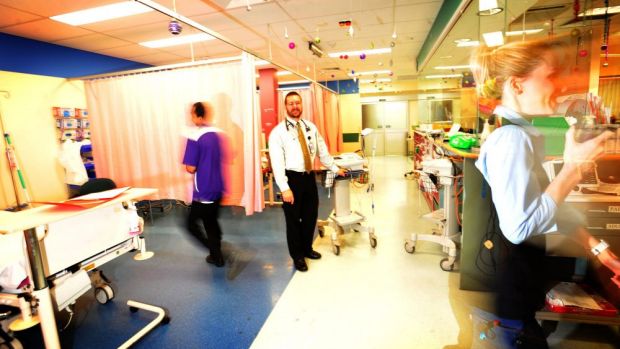
The emergency department at Calvary Hospital. Photo: Karleen Minney
Canberrans who visited the ACT’s two emergency departments during 2013-14 recorded the lowest levels of satisfaction with doctors and specialists in Australia, with up to 25 per cent citing a lack of respect and attention.
The Productivity Commission’s Report of Government Services, released this week, found only three quarters of patients at the Canberra and Calvary Hospitals believed doctors of specialists always listened to them, or spent enough time with them.
This figures was the lowest rate of satisfaction in Australia and below the national average of 85.4 per cent or the 90.6 per cent recorded in the Northern Territory, although approval rating were higher for nurses.
Close to 77 per cent of emergency department patients though doctors or specialists always showed them respect – again below the national average of 86.5 per cent – with approval rating higher for nurses at 85.1 per cent.
Director of the emergency department at Calvary Hospital Stuart Stapleton said consistently clear communication with patients was every service providers’ objective and priority.
“I believe that I can speak on behalf of every emergency department across Australia in saying we want every patient to receive the most appropriate care and to feel positive about their experience.”
“Time pressures are an obvious issue for both parties – in all clinical settings high presentation levels increase the workload on clinicians.
“It may become extremely difficult for a clinician to spend the time with a patient that the patient considers ‘enough’.”
Dr Stapleton said it was important to consider the settings in which emergency department patients and clinicians communicated.
“Shared spaces in emergency departments, busy areas with frequent interruptions, staff changeovers, people and equipment movements, and large numbers of people who are strangers to the patient, do not always create an environment conducive to clear interpersonal communications,” he said.
“We also need to be mindful that patients are frequently unwell, almost always anxious and in most instances in an uncommon and foreign setting.
“These factors obviously impinge on effective and clear communications, and more heavily for the patient – the ‘stranger’ to the setting – than the clinician who is familiar with the setting.”
Dr Stapleton said it was important to remember that emergency department staff were also real people with their own families and lives.
“We have our own sick children, we want help when our partners are sick, we are concerned by our parent’s wellness, we have moments when we worry about our own health,” he said.
“Our familiarity with sickness and health problems does not in way diminish our appreciation and understanding that every person is significantly affected by a health emergency.”
The productivity commission report also found there were 50,486 potentially avoidable “GP-type presentations” to ACT emergency departments during 2013-14, which was an increase on the 44,535 presentations recorded during 2008-9.
“The positive aspect of these types of presentations is that our emergency department team address the patient’s immediate concern or anxiety, provide assessment, appropriate treatment and care.
“In many instances, the emergency department will then initiate ongoing follow up and treatment in a clinic or GP setting.”
Dr Stapleton said these presentations were not an impediment to the function of emergency departments.
“The positive aspect of these types of presentations is that our emergency department team address the patient’s immediate concern or anxiety, provide assessment, appropriate treatment and care,” he said.
“In many instances, the emergency department will then initiate ongoing follow up and treatment in a clinic or GP setting.”
Dr Stapleton said it was important for the community to recognise that hospital emergency services were just one modality in a complex health system
“Across Australia emergency departments are always looking at how they can consistently deliver timely and high quality care for all patients.
“Emergency departments are the safety net for the system.”
